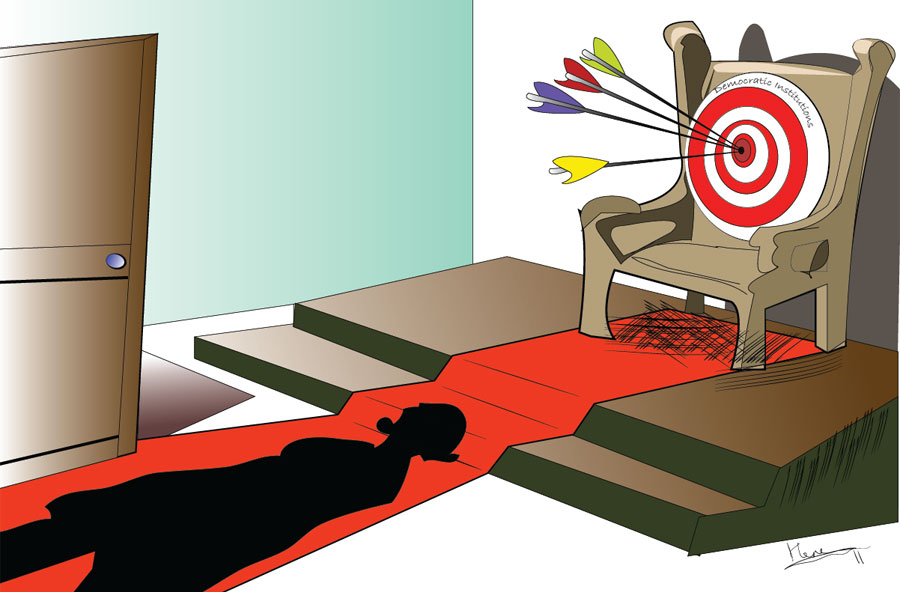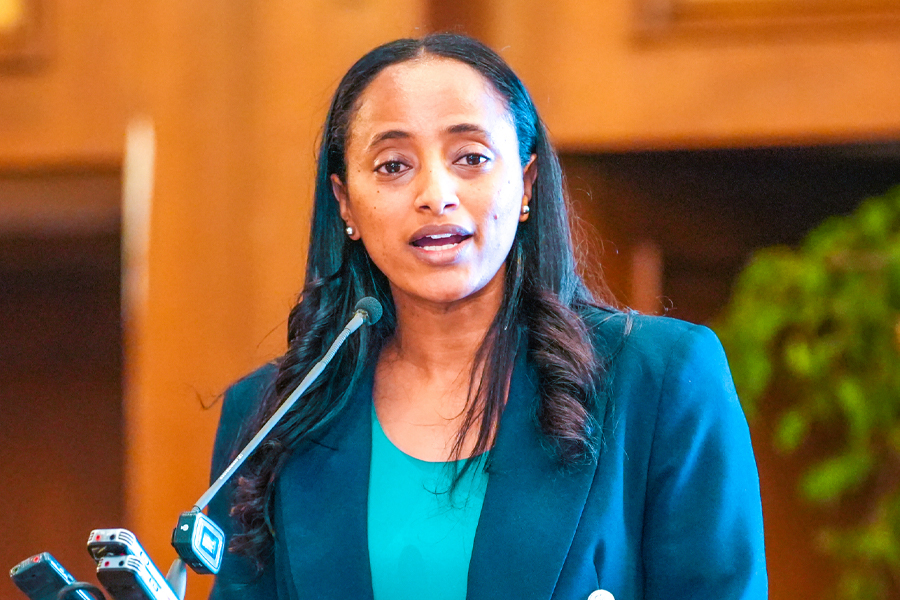
Radar | Feb 17,2024
The public sector is set to see a salary adjustment of up to 300pc to its employees in hopes of addressing the cost of living that arises amid new macroeconomic reforms.
Prime Minister Abiy Ahmed (PhD) disclosed 90 billion Br allocated for this wage increment in the supplementary budget bill, which will be presented to Parliament. The Prime Minister emphasised that the salary adjustment is intended to support economic classes who will bear the weight of short-term economic shocks. He noted that civil servants, particularly those in lower positions within federal agencies, are the first bearing the brunt of inflation.
"This is the first time in history," he said.
Abiy acknowledges the struggles of civil servants earning as little as 1,500 Br, stressing the necessity of the wage increment. This move comes as his administration liberalises the foreign exchange regime to achieve macroeconomic stability and reduce inflation, ultimately promoting a sustainable economic environment. He said: "However, it won't be an easy road."
The Prime Minister pointed out that the reform has been long overdue, with deep-seated economic structural issues persisting for years. He acknowledged that the country would experience short-term hardships before achieving economic sustainability.
"It will be tough for a short while," he said, "but it will bear benefits."
Yigezu Jemaneh, head of work evaluation and payment research at the Civil Service Commission, stated that implementation plans are pending. He noted that wage increases would vary, with those in lower positions seeing more increments, while higher-level employees may not see any adjustment.
"We have to wait until the finances are disbursed," he said.
Last week, a high-level discussion aimed to clarify the new reforms. Fitsum Assefa (PhD), minister of Planning & Development, reviewed the past performance and the rationale for the reforms. She disclosed that despite challenges, the home-grown economic reform had led to increased tax revenues, a reduced debt burden, and a rise in exports. However, she also acknowledged ongoing structural issues, including a balance deficit between exports and imports, the proliferation of illicit foreign currency, and a lull in investment performance.
Fitsum justified the reforms as necessary to address deeper structural issues and promote investment efficiency. She emphasised that while short-term shocks are inevitable, long-term sustainability is promising. The government aims to increase federal income, streamline tax policy, control government expenditure, and manage debt effectively.
At the same time, Parliament approved a 500 million dollar long-term loan from the World Bank, part of a 1.5 billion dollar finance package from the International Development Association (IDA). Ahmed Shide, minister of Finance, stated that the loan would be used as part of the federal government's additional budget to strengthen social safety nets for vulnerable households, including civil servants. Subsidies on essential commodities such as fertilisers, pharmaceuticals, and housing will be provided.
"Our budget this year is bound to be excessive," he said.
A study by the International Labour Organisation revealed a significant gap between nominal and real wage growth in Ethiopia. While average monthly wages have tripled over the past decade, reaching a median of 3,000 Br, the actual purchasing power of these wages has increased by only 7.4pc due to soaring inflation. This disparity is particularly pronounced when comparing the public and private sectors, with civil servants earning an average of 4,000 Br, while many in the private sector face even lower wages.
For civil servants like Melat T. Giorgis, 30, the adjustment matching up with the cost of living is a real concern. Working at a federal agency for the past seven years, Melat shared her struggles with a monthly wage of 6,000 Br. As a mother of two, she relies on her husband's salary from a private company to pay their 12,000 Br monthly rent.
"My salary was never enough," she said, expressing doubt that even tripling it would address her financial challenges given the rising cost of living. "It can only do so much."
Economist Arega Shumete (PhD) expressed scepticism about the sustainability of salary increments amid rising commodity prices. "Wage increment is just an illusion," he said, noting that inflation diminishes purchasing power despite wage increases. He suggested that the government should have subsidised essential commodities for civil servants instead.
Arega also doubted that the economic shocks would be short-term, citing political instability and the absence of responsive exportable commodities. He warned that the country might face prolonged recovery challenges.
"There is a possibility that the country might not recover for a long time," he said.
PUBLISHED ON
Aug 04,2024 [ VOL
25 , NO
1266]

Radar | Feb 17,2024

My Opinion | Aug 26,2023

Fortune News | Jul 08,2023

Fortune News | Jan 01,2023

Radar | Aug 05,2023

Fortune News | Feb 29,2020

Editorial | Dec 05,2018

Radar | Apr 27,2025

Commentaries | Jun 15,2024

Agenda | Dec 30,2021

Dec 22 , 2024 . By TIZITA SHEWAFERAW
Charged with transforming colossal state-owned enterprises into modern and competitiv...

Aug 18 , 2024 . By AKSAH ITALO
Although predictable Yonas Zerihun's job in the ride-hailing service is not immune to...

Jul 28 , 2024 . By TIZITA SHEWAFERAW
Unhabitual, perhaps too many, Samuel Gebreyohannes, 38, used to occasionally enjoy a couple of beers at breakfast. However, he recently swit...

Jul 13 , 2024 . By AKSAH ITALO
Investors who rely on tractors, trucks, and field vehicles for commuting, transporting commodities, and f...

Oct 25 , 2025
The regulatory machinery is on overdrive. In only two years, no fewer than 35 new pro...

Oct 18 , 2025
The political establishment, notably the ruling party and its top brass, has become p...

Oct 11 , 2025
Ladislas Farago, a roving Associated Press (AP) correspondent, arrived in Ethiopia in...

Oct 4 , 2025
Eyob Tekalegn (PhD) had been in the Governor's chair for only weeks when, on Septembe...